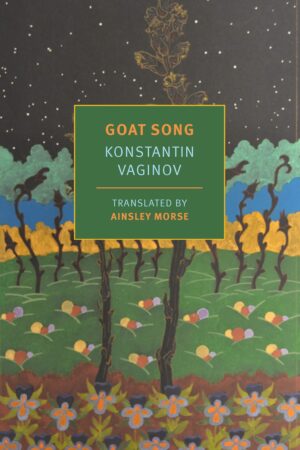Goat Song
by Konstantin Vaginov, translated by Ainsley Morse and Geoff Cebula
reviewed by Eric Vanderwall
“Now there is no Petersburg. There is Leningrad.” The “now” in question is the 1920s, and the change in the city’s name conveys something of the enormous changes underway as the early Soviet Union took shape and the vestiges of the imperial period quickly disappeared. Against this backdrop, Konstantin Vaginov (whose name, like that of his city, had also changed) published Goat Song in 1927 and The Works and Days of Whistlin in 1929, the first two of four novellas completed before his death from tuberculosis in 1934. NYRB’s newly released volume collects these two novellas in translations by Ainsley Morse and Geoff Cebula, and there are plans for a subsequent volume collecting Vaginov’s latter two novellas.
Goat Song follows the lives of several artists over the course of several years as they struggle to adjust to the new Soviet era—a “repulsive age” in which there is little room or respect for art. Some characters, such as the semi-autobiographical writer Balmcalfkin, attempt to “succor the degenerating culture” by continuing to write their experimental works or teach ancient languages. Others, “willing to stand on the side of the modern age,” betray the spirit of art in order to make money on government-approved, “edifying fairy tales for kids” and “prole-lit” in a society rapidly losing tolerance for unorthodox views.
The title Goat Song is an overly literal rendering of the ancient Greek word for tragedy, and like traditional tragedy, Goat Song is concerned with narratives of individual and societal decline. Unlike the traditional forms of tragedy, though, Goat Song is not plot-driven but animated by Vaginov’s poetic technique of “juxtaposition of words,” a practice of connecting words in intentionally nonlogical or ungrammatical ways. Such language makes for a beautifully disorienting experience, as readers encounter “a round table illuminated by an icy red sun,” see “boarded-up, frightened streets” and a “glinting” sea “illuminated by a moon that had been deposed,” and hear how the “possibility of war, like swamp fires, flickered somewhere very close by.” This technique—at times reminiscent of Isaac Babel’s in the Red Cavalry stories and Konstantin Paustovsky’s in The Story of a Life—evokes for the reader the same kind of dizziness the characters feel as they struggle to navigate an incomprehensible, topsy-turvy society rapidly becoming more so.
In The Works and Days of Whistlin, the titular character calculatingly cultivates relationships to gather material for his novel. The “beyonsensical” style is not quite as prominent as in Goat Song, and the narrative is more tightly focused on a single character—Whistlin—and his utilitarian friendship with the “Soviet Cagliostro” Psychofsky, an occultist charlatan. Whistlin, whom Vaginov based closely on himself, receives some satirical treatment as a writer with “his own world of ideas” but “nothing to write about” who merely transposes real people into his book. In a metafictional turn, he ultimately transposes himself, “pass[ing] entirely into his book.”
NYRB’s edition of Goat Song is a worthy addition to the publisher’s offering of Russian literature in translation, and Morse and Cebula have done a fine job of bringing these experimental works into English. One of the most noticeable features of their approach is their decision to devise names that approximate in English Vaginov’s wordplay in Russian. Balmcalfkin, Asphodelov, Kissenkin, Kittenkin, Whistlin, Cuckoo, Psychofsky—the translators explain in their afterword how they concocted each name based on what Vaginov seemed to intend. The introduction, afterword, and endnotes are all helpful guides to the reader in understanding the novellas and their historical position. (A long section on how Bakhtin’s analysis of Dostoevsky applies as well to Vaginov is particularly enlightening.) This volume is sure to delight readers interested in Russian literature and the various forms of European modernism, as well as anyone interested in experimental and avant-garde literature. Even at nearly a century old, even in translation, Vaginov can still take readers on a journey into “the magical depth of words.”
Published on October 7, 2025

